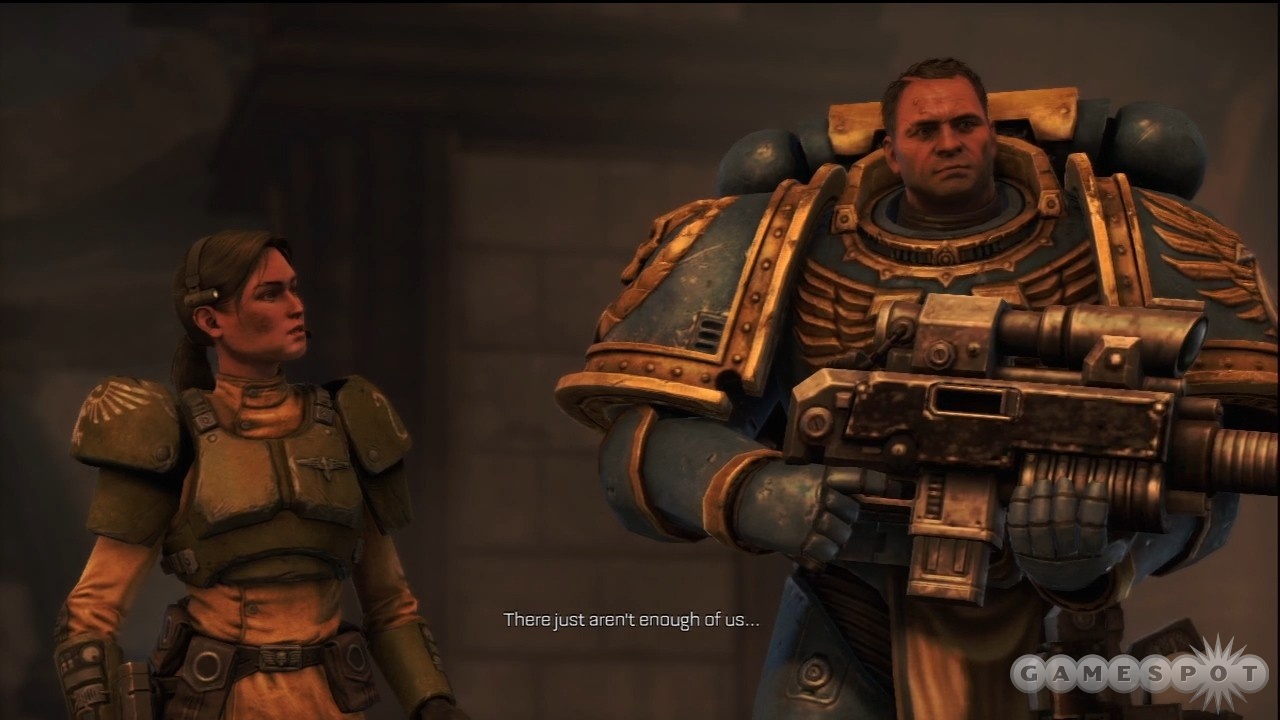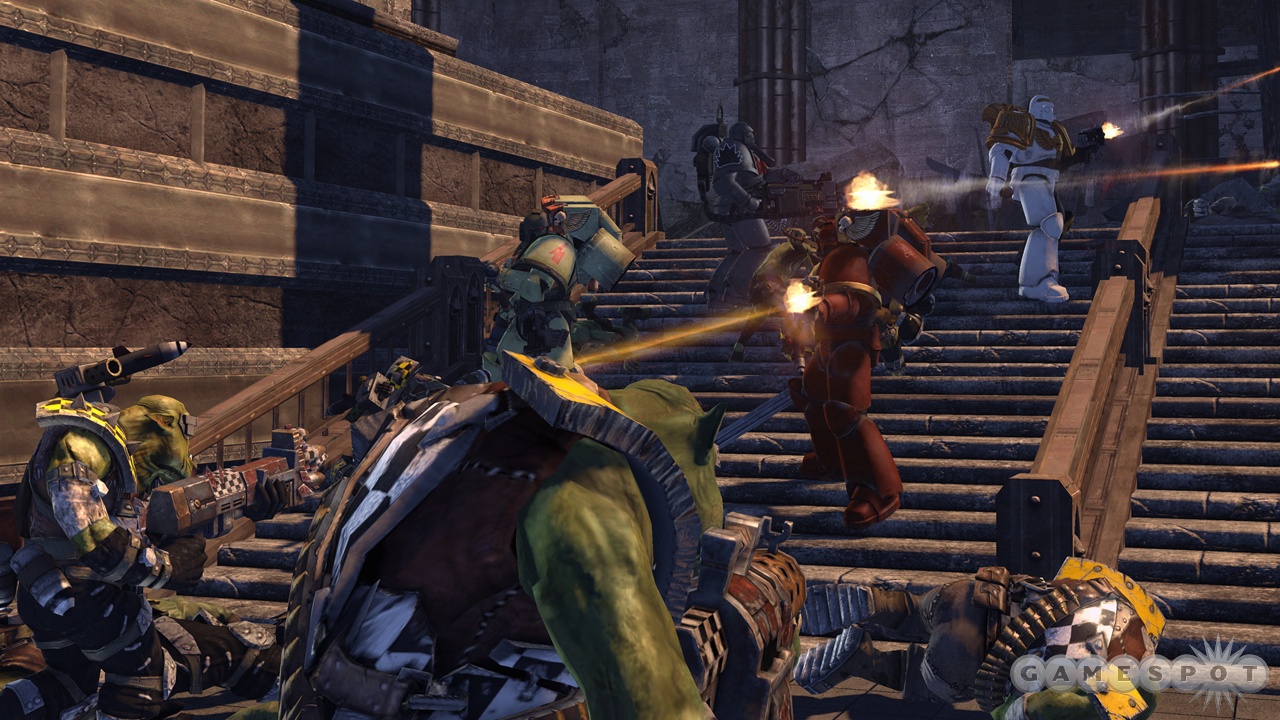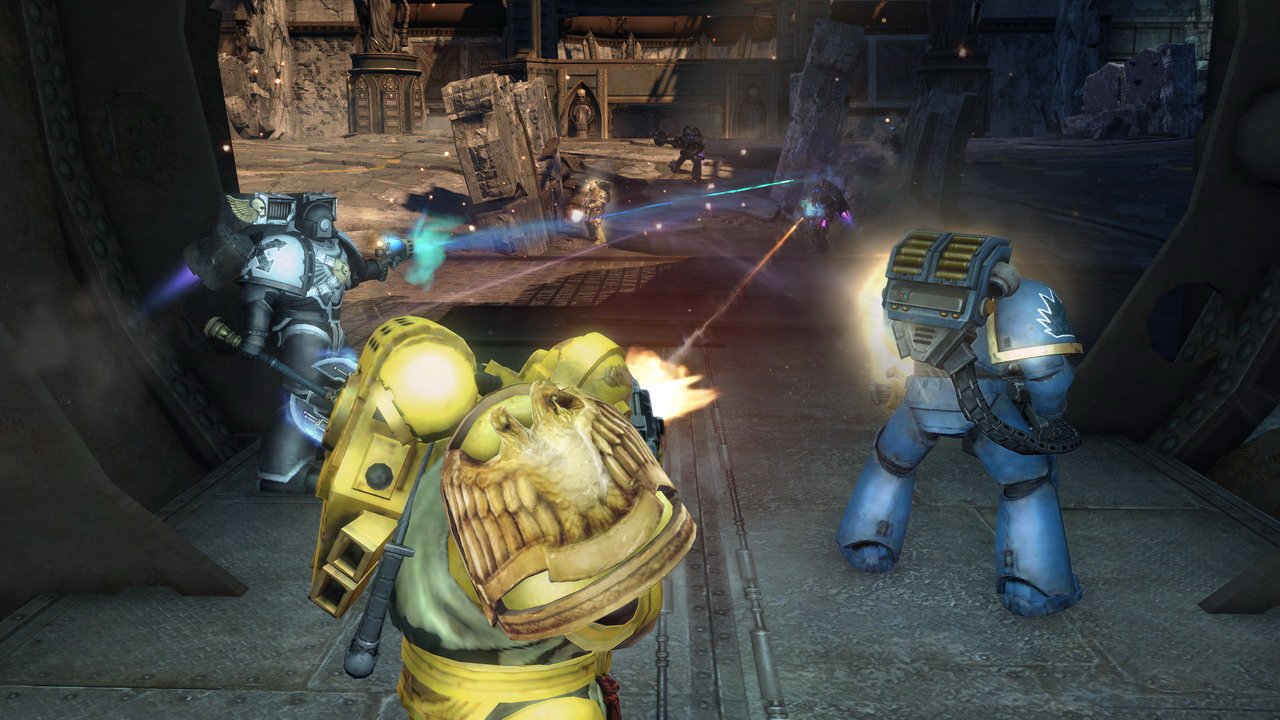Sound Byte: Meet the Composers Behind Warhammer 40K: Space Marine
Here's your chance to listen to Captain Titus' theme in the latest Sound Byte.
 It's common for an action game to be paired with a musical score that can be described as "epic" or "grandiose." But then it runs into the problem of sounding just like any other action score. Composers Cris Velasco and Sascha Dikiciyan wanted to avoid that by taking a "less is more" approach when it came to scoring Warhammer 40,000: Space Marine. The game follows Captain Titus of the Ultramarines and his struggle to save humanity. Listen to the tracks below to see how Titus is represented musically, and read about how the two composers collaborated on the soundtrack. The soundtrack will be available on September 20.
It's common for an action game to be paired with a musical score that can be described as "epic" or "grandiose." But then it runs into the problem of sounding just like any other action score. Composers Cris Velasco and Sascha Dikiciyan wanted to avoid that by taking a "less is more" approach when it came to scoring Warhammer 40,000: Space Marine. The game follows Captain Titus of the Ultramarines and his struggle to save humanity. Listen to the tracks below to see how Titus is represented musically, and read about how the two composers collaborated on the soundtrack. The soundtrack will be available on September 20.
GameSpot: Could you both start off by telling us a bit about yourselves and your musical backgrounds?
Sascha Dikiciyan: Originally from Berlin, Germany, I have been living and working in Los Angeles for the last 18 years. Ever since I was a kid, I was passionate about video games. My second passion was music, and after I discovered how to make noises on my Amiga (which was way cooler at the time than the piano), it was all over. It was only logical to put them both together and make a career out of it.
Cris Velasco: I've lived in California my whole life, but I moved to Los Angeles about 17 years ago to study music composition at UCLA. I actually played guitar in a death metal band prior to studying music. That eventually transitioned into classical guitar. Once I discovered Mozart, though, that led me down the path of studying orchestral music full time.
GS: Both of you have extensive experience working on video games. How did you initially get started in the video game industry?
SD: Around 1997, after I finished my music studies in Los Angeles, I produced a Quake add-on audio CD (Methods of Destruction) out of my bedroom. It basically had a whole new set of tracks to play Quake DM to. I sold almost 2,000 copies by myself. A few weeks later it so happened that I was hanging out in some Quake Mirc channel (the well-known chat app back then) where I started talking to someone from id Software, who evidently had a copy of my CD. We started chatting, and next thing you know I had to submit some music for Quake 2. The rest really is history now.
CV: My entry into video games was a gradual process. I went through the "paying my dues" phase for nearly eight years before I landed my first major title. I was hired to score just one (!) cinematic for Battlestar Galactica. At that time, though, this was a huge success for me. I put every bit of determination I had into that one track. The guys at Vivendi-Universal liked it so much that they gave me a few more, and then a few more after that too. I then went on to work on three more of their titles within the next year.
GS: THQ is taking a very different approach with this franchise. How did you approach the music of Warhammer 40K: Space Marine? Could you talk about the score and the style?
Sascha & Cris: We said to ourselves right from the start, let's not be just another action game score. We wanted to write a real score, something that would involve the player emotionally more than anything else. Of course there's action. However, we often approached it from a "less is more" perspective. We knew early on that we wanted to stay organic, so the first thing we did was to record a lot of live taikos and other big drums (thanks to M.B. Gordy) to be used throughout the score. This percussion was also used for the custom interactive part that supports the tribal nature of the Orks. Now the trick was to add some additional layers, besides the orchestra, to give the score a bit of an edge without taking the whole thing out of the organic sound palette. We spent a lot of time doing musical sound design on a lot of the cues. It's there to be an invisible support. On the other hand, when the faction Chaos appears, we decided to make a 180. Basically, Chaos are represented by distorted pads, gnarly synths, and other crunchy percussion elements. It's a stark contrast that Relic wanted from the beginning.
 GS: Do you work closely with the rest of the audio team, or do you guys work separately?
GS: Do you work closely with the rest of the audio team, or do you guys work separately?
Sascha & Cris: The first thing we did was fly out to Vancouver. We met the core team of Relic and spent an entire day going over the game, its story, structure, and what music was exactly needed. They also had some cool ideas about interactivity that we worked hard on. Once we got into the serious writing stage, we would talk on an almost daily basis with the audio lead, Glenn Jamison, for feedback and guidance. It's very much a team effort that requires good communication, especially when you have to write 120 minutes of music on a tight schedule.
GS: What is it like collaborating with another composer on a soundtrack compared to working on your own? Do you have any preference? Pros and cons?
SD: Well, Cris and myself have worked on many titles before, so we are a well-oiled machine, if you will. Of course we each work on our own projects, but a project so massive as Space Marine, it's good to have two people on board. It's great to write something and then immediately get feedback. Of course, we don't always agree at times, but that's just part of the creative process. In the end, it will always lead to better music. And that will always be our main goal. Write great music.
CV: Exactly. The biggest reason we continue to work together on big projects like this is that it always leads to a better score. We've done something like 25 to 30 AAA game projects together now, and I feel proud of each of them. I know that we've done a good job if I can send a CD of the music to my mom after we're done!
GS: What were your main goals in regard to the score? Do you feel like you've achieved them?
Sascha & Cris: We really wanted to get the player emotionally connected to Titus, the supporting characters, and the overall world of Warhammer. Not just be another action score. We wanted it to mostly be an "un-typical" game score. Game music in general still has this reputation of being inferior to movie music. Mostly because a lot (not all) of game music tends to be very one-dimensional. Basically, all action. We think our score for Space Marine proves that you can have an emotional/cinematic score that will work within the context of an action game.
GS: Were there any difficult challenges you've had to overcome? How did this compare to your previous works?
Sascha & Cris: The challenge always starts off the same: we need to find something recognizable. Something that the player will be unconsciously humming when they leave the game. This can be a motif or melody of some sort. It can even just be a sound or rhythm. Also, we always want to better our previous work, so that's a huge task right from the start. In the end we did come up with a motif that became Titus' theme. It is a simple yet powerful statement that we build upon throughout the whole game.
GS: What other artists in the game music industry do you admire and why?
SD: Nile Rodgers and his Sumthing Else Music Works label and distribution company. They opened a lot of doors for video game soundtracks. Previously it was very difficult to get the music out to the fans.
CV: I've always given a lot of credit to Lennie Moore and his score for Outcast. This was the score that made me want to write music for games! I feel very fortunate to now be close friends with the people I used to idolize.
GS: What kind of music do you listen to now?
SD: My current playlist consists of the new Atari Teenage Riot, Prodigy, UNKLE, Massive Attack, and of course plenty of soundtracks. I am anxiously awaiting Bjork's new album. She's amazing.
CV: I still listen to mostly classical music and film scores, but I have to stay true to my roots, too, so I also occasionally listen to bands like Slipknot and Lamb of God when I need to get the blood going! I'm a big fan of world music too. Recently, I've been playing a lot of Silk Road Ensemble and Niyaz.
GS: What are your biggest influences?
SD: I think for me, the early '80s and '90s of electronic music. I remember hearing New Order for the first time. It blew my mind. Also Depeche Mode and synth pioneers like Vangelis have a big influence on my sound. And let's not forget the industrial movement in the early '90s. Skinny Puppy and of course NIN. And lastly, growing up in a very classical house--my mom played classical piano--there always was Mozart, Mahler, and Beethoven in the air. While not my most important influences, they have certainly shaped who I am today as a composer.
CV: Shostakovich, Prokofiev, Tchaikovsky, Debussy, Beethoven, Mozart, etc. I've also spent countless hours poring over the scores from contemporary composers like John Williams, Danny Elfman, James Newton Howard, John Powell, Bernard Herrmann, etc. I also find that I am extremely influenced (inspired) by art, books, photography, and good food and wine. I think it's amazing how much inspiration a pencil drawing and a tiny little cabernet grape can have on a person!
GS: Any advice for aspiring composers who want to get into the industry?
SD: I would advise to (a) learn the fundamentals of music. There's no way around it, and it will always come in handy later on. (b) I think it's important to create your own sound so that people can immediately recognize that it's your work. Finally, get your music on YouTube, Soundcloud, etc. and try to promote it on as many social media sites are you can. There is a lot more competition today (as compared to 1997), but there are also so many new ways for people to listen to your music now.
CV: Beyond what Sascha mentions, I would add passion and tenacity. If you're aspiring to be a composer for games, you have to love it. Competition is fierce. When I was starting out, I had no backup plan. I knew I had to write music for games. To quote Galaxy Quest, "Never give up. Never surrender!"
GS: Thank you for your time!
Got a news tip or want to contact us directly? Email news@gamespot.com



Join the conversation